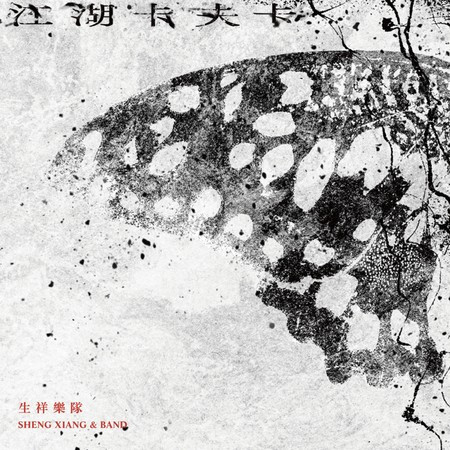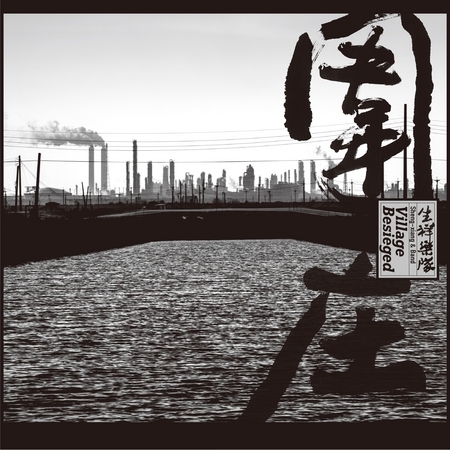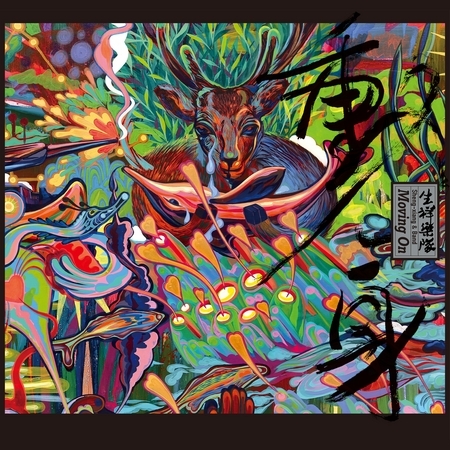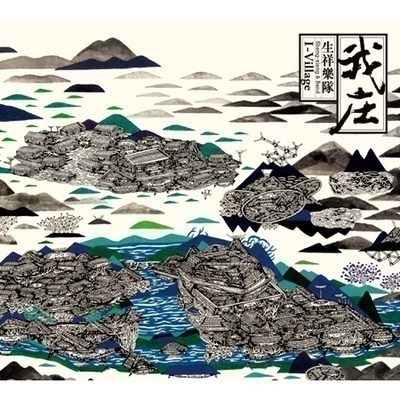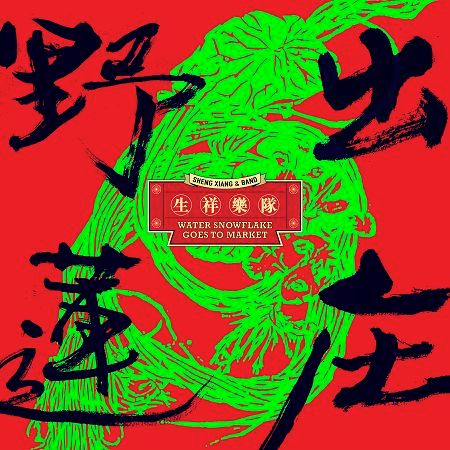
野蓮出庄
生祥樂隊
2020-11-28 · 本土方言/流行音樂
菸草沒落,人出庄。 2000年代中我在嘉義的海產攤初遇破布子炒水蓮、山蘇又蒸魚,記憶被撞開了裂縫。除了靜素躺在飯桌上與母親相對眼,沒想到對面烏尚可如此靈活!更納悶:我們不常吃的野蓮,何以出庄且易名?困惑中,我夾一顆對面烏入嘴,兒時的澀苦在舌根處轉甘甜,令我不禁揣想:難道離家夠久、吃苦夠多,才得品嚐對面烏? 那滋味引我再度回家。 我回返母親獨自採收、製作對面烏,以及每餐一碟的場景,試圖探究她的心境。我跟著她走出除草後的第一期稻田,腰夾的臉盆上擠滿挑好的野菜。她疲憊,但幾絲愜意流露。我領會水田的賞賜,不再排斥連吃一週斛菜或冇筒梗炒黃豆醬。七月半,我安靜看她備料,蒸芋頭粄,不再質疑家裡人愈少、粄卻愈厚,明瞭那是對外出子女的召喚與祝福。年三十下午,我忍住玩興,盯著屋後的大鋁鍋,乖乖掌火。母親在灶下忙進忙出,姊姊們已催緊手腳,仍不免招念。我面前這一鍋大封,不只是我對食物的至高期待,更是家族團聚的圓心,以及長媳的年終考評。我不能失手啊!必須把火餵好、餵穩。 社造牽線,去阿里山拜訪鄒族,主人留客午飯。村長端出我本以為客家地道的樹豆湯,食物地域觀隨被破解,提醒我穿越鄉愁之必要。我拜會本土種黃豆的復育者,探訪幾位回鄉開設豆腐坊的朋友。他們難忘豆腐郎吆喝,以及植物蛋白質之於社區的重要;他們倡議的保種運動,連接了母親掛曬在窗櫺上的各種蔬果種子。幾位原住民採集文化的研究者解開我的野菜邊界,放打烏子流浪。期間,美濃愛鄉協進會的朋友呼應創作計畫,廣泛訪談,證實了食物傳統的堅韌延續力。他們關注後菸草時代,農民尋找另類經濟作物的歷程,理解野蓮產業的在地意義,及其全球化機會與困境。 食物的部首是「女」--她們是食物的主要採集者、製作者、保存者與教育者。但面帕粄連繫父親:考試、繳菸得意,他帶去粄仔店;稿賞工人,叫我去包回來。凡此,面帕粄總造成米食最高級感。工作至嘉義,必吃火雞肉飯;看各家以自製雞油淋飯,亦予我同樣印象。 生祥讀詞,聯想日本的「B級美食」比賽,主角是非主流的鄉土菜肴。我們的食物場景若有配樂,亦當是在地流行音樂:流動攤車的叫賣聲與隨取音樂、婚宴場上的中西混種音樂,以及李文古笑科劇、金光布袋戲、神明生日晚會中的戲仿音樂等等,生祥總稱為「B級音樂」。 那麼,就請乘著B級音樂,聽我們唱這些食物與人的流浪故事。 “Water Snowflake Goes to Market” Tobacco declined, and water snowflake went to market. It was in the 2000s at the seafood stall in Chiayi that I first came across bird-catcher berries stir-fried with water snowflake, steamed with fish, and with fern leaves , knocking open a hole in my memory. I had never imagined that these pickled berries that looked like eyeballs, could do so much more than sitting still on a table of vegetarian dishes and stare back at my mother looking back toward them. And more puzzling still: how could the “water snowflake” that we hardly ate at all back home have left the village, changed its name, and flooded the market? In my perplexity, I picked up a pickled berry with my chopsticks, and let the astringent flavor I remembered from childhood roll around the base of my tongue until it slowly revealed its sweetness. I suppose it’s only after you’ve left home for a long time and suffered your share of bitterness that you can savor the taste of bird-catcher berries? That taste drew me back home once again. I return to when my mother would personally pick and prepare bird-catcher berries to lay out a small plate of them at every meal. What would she have been feeling then? I follow her out of the rice paddies after the first weeding, with a little wash basin tied to her apron filled with wild greens she had carefully picked from the ground. Tired, but not without letting slip a certain satisfaction. I understand now the bounty of the paddies, and will no longer be so reluctant to eat pondweed and gooseweed with soybean paste all week long. When the Ghost Festival comes, I sit quietly and watch her prepare the ingredients for taro root dumplings, and no longer wonder why they get thicker and more appetizing the fewer people are left at home — the better to call those who have gone out into the world to come back, and to bless them. On the afternoon before New Year’s eve, I can hardly hold back my excitement as the great big double-alloy stew pot is set up in the back yard, and I dutifully help kindle the fire underneath. Mother bustles back and forth around the stove, and my sisters quicken their movements to match, but not fast enough to avoid her scolding. This pot of sugarcane bottom braised stew in front of me means not only the best thing one could ever hope to eat, but also the hope of family togetherness, and an annual trial for the wife of the family’s eldest son. There’s no room for error — I have to feed the flames well and keep the heat steady! In the course of making contacts for community development, I go to Ahlishan to pay my respects to the indigenous Zou people, and my hosts invite me to stay for lunch. The village head brings out a platter of what I mistake at first for an authentic Hakka-style pigeon pea stew. My ideas about which foods belong where are displaced, and I am reminded that I need to get beyond my own homesickness. I visit someone who has revived a local variety of soybean and I call on some friends who have come back to the village to open a tofu workshop. The unforgettable sound of the itinerant tofu guy calling his wares; the importance of vegetable-derived protein to the community; their advocacy for the preservation of local cultivars; these call to mind how my mother used to hang all kinds of seeds from the window-frames to dry. A few researchers of the indigenous culture of foraging break open the boundaries of how I had understood vegetables in the wild, and set bird berries free to wander the land. Meanwhile, friends from the Meinung People’s Association are calling for us to create a plan and seek out dialogue on how to shore up the resilience and sustainability of our foodways and culinary traditions. They are focused on a new era after tobacco, on the experience of farmers who have been looking to create alternative economies and crops, and on what it has meant locally for Meinung to produce water snowflake, and the promises or pitfalls that lie ahead on the global market. The essential component of the character for food is “woman” 女, for they are the foragers, producers, preservers, and educators. But “face-towel noodles” are tied to my father. When test scores or tobacco harvests were high, it was he who would elatedly take us to celebrate at the rice-noodle stall. When the workers in the field were to be rewarded, he would have me bring them noodles. All of this gave me the feeling that “face-towel noodles” were the very best thing that can be made out of rice. When I moved to Chiayi to work, I had to try the famous turkey rice there, and observing how each stall specializing in this dish made their own special chicken schmaltz to drizzle over rice, I started to have the same impression. When Sheng-xiang read the lyrics, he was reminded of Japan’s “Grade B cuisine” competitions in which the contestants were all sorts of non-mainstream and local specialties. If our food has a soundtrack, it would be local pop music; the advertising jingles and notifications to customers that their order is ready broadcast from portable food carts; the mingled Eastern and Western sounds of outdoor wedding parties along with Li Wengu’s raucous comedic skits; the opera tunes that ring in the birthdays of our gods at temple festivals and shrines, and the like. Sheng-Xiang calls all these kinds of sounds grade B-music. Well then — please let our grade B-music transport you into the vagabond stories we sing here about food and about people.
